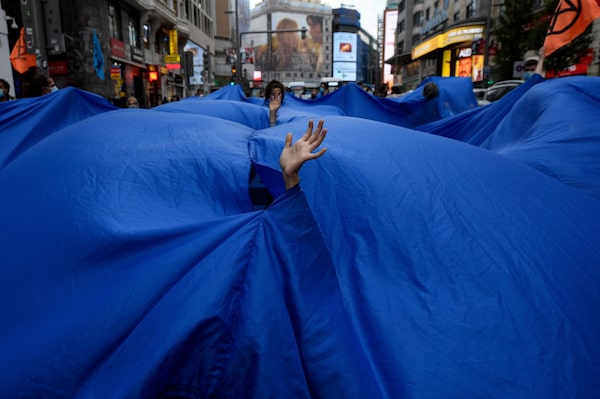Good afternoon, and welcome to Globe Climate, a newsletter about climate change, environment and resources in Canada.
Joe Biden being elected the next president of the United States provides a lot of answers around the next steps in how U.S. politics will impact Canada’s climate plans. But it also introduces a number of new questions.
If you have questions or are interested in learning more join us on Thursday, Nov. 12 at 1:30 p.m. ET as Globe columnist Adam Radwanski talks to Sarah Petrevan, policy director at Clean Energy Canada, about what Biden’s election win means for Canada’s climate strategy.
Mark it in your calendars, and watch the live video on our Facebook page later this week.

Joe Biden is the next president of the United States. What does that mean for Canada’s climate plans? Adam Radwanski and Sarah Petrevan will answer your questions.
Join us this Thursday at 1:30 p.m. ET
Now, let’s catch you up on other news.
Noteworthy reporting this week:
- Environment Minister Jonathan Wilkinson was grilled about why more than a year after the Liberals pledged to exceed Canada’s 2030 emissions reduction targets, legislate targets to reach net-zero emissions by 2050 and plant two billion trees by 2030, the government has yet to move ahead on any of those plans.
- Inuit-owned Pituvik has partnered with Innergex to build a hydroelectric plant in northern Quebec. The project, 12 years in the making, marks the first-ever partnership between an Inuit-owned corporation and an independent power producer, and creates a template for green developments in the north.
- Former Bank of Canada governor Mark Carney says the private finance sector will play a crucial role in helping countries – including Canada – hit their goal of net-zero greenhouse gas emissions by 2050.
A deeper dive
Joe Biden will change the calculus of Canadian climate policy
The following is an excerpt from Adam Radwanski’s break down on how Biden’s presidency will impact Canadian climate policy. Click here to read the full article.
With Joe Biden as its next president, the United States will rejoin the global fight against climate change.
Mr. Biden may not be able to make good on all the climate ambition of his election platform, which included $2-trillion in green spending. If Democrats fail to win control of the Senate, it stands to limit his ability to pass legislation.
But he will still be able to use executive powers and federal agencies to reverse Donald Trump’s slashing of environmental regulations. He will support climate efforts by states and the private sector, rather than actively impeding them as Mr. Trump did. He will return the U.S. to the Paris Agreement and, per his campaign platform, try to take a global leadership role in setting more ambitious emissions-reduction targets.
In the process, Mr. Biden will also change the calculus around Canadian policies to fight climate change.
For the past four years, Prime Minister Justin Trudeau has lacked an ally in the White House who shares his government’s interest in the issue. Mr. Trudeau’s Liberals will be glad for the chance to co-operate on continental efforts, in some cases even being able to follow the Americans' lead.
At the same time, Mr. Biden could also challenge Mr. Trudeau and other Canadian leaders to up their game, including when it comes to competing with the U.S. for clean-technology investment. And the president-elect’s promised push to decrease U.S. reliance on fossil fuels could exacerbate regional tensions in Canada, by adding to the woes of its oil and gas industry.
It remains to be seen how aggressively Mr. Biden, a relative moderate whose sweeping climate agenda partly reflected an attempt to appease Green New Deal Democrats, will try to advance that agenda while also confronting myriad other challenges.
- Adam

People celebrate outside City Hall after Joe Biden was declared winner of the 2020 presidential election on November 7, 2020 in Philadelphia, Pennsylvania.BRYAN R. SMITH/AFP/Getty Images
What else you missed
Arctic animals adapting to climate change, but it may be causing population declines: A huge new archive of how animals move across the Arctic from season to season gives the clearest picture yet of how species from eagles to caribou are evolving in the face of climate change.
Ottawa confirms methane reduction deals with Alberta, Saskatchewan and B.C.: But environmental groups point to Environment Canada’s own data showing neither provincial nor federal regulations will meet Canada’s targets.
Canada could help supply ‘energy transition metals’ but faces stiff competition, observers say: Canada is well-endowed with copper, aluminum and nickel resources and could attract some of those investment dollars, says Julian Kettle, Wood Mackenzie’s vice-chairman of metals and mining, but it faces the same price-related issues as the rest of the world.
Opinion and analysis
How to better determine the social and environmental impact of your portfolio
Leslie Cliff and Mike Thiessen: “Becoming more aware of the net impact of investments will enable all tiers of investors and decision makers to better align investments with their values and strive for a more positive overall impact on the environment and society.”
Renewable stocks have (a little too much) wind at their backs
John Heinzl: The presumed victory of Democratic presidential candidate Joe Biden, who has proposed investing US$400-billion in clean energy and climate research, has given these stocks another lift.
What readers had to say
Readers have already started to respond to our story this week about Environment Minister Jonathan Wilkinson defending his government’s record on climate action. Here’s what some had to say:
MMacK: “Given that we’ll be living with effects of current level of greenhouse gases in atmosphere for centuries, it would be smart to now take actions to mitigate those negative impacts.”
OldBanister: “The truth is that we have known that climate change would be an existential problem for the last 30+ years. In that time we have done basically nothing – other than increase oil output.”
Environmental Defence: “We’re also a G7 country with considerable international influence for our smaller population. What Canada does on climate has a major impact.”
Making waves
Each week The Globe will profile a young person making a difference in Canada. This week we’re highlighting the work of Brenna Walsh, who is advocating for city-scale climate action.

Brenna WalshHandout
My name is Brenna Walsh, I’m 32 years old and I’m a champion for city-scale climate action. Climate change is less daunting when we think at the scale of cities and communities – it engages citizens and allows people to see benefits on the ground.
I have been exploring how different stakeholders can come together to act and contribute their knowledge and expertise to the local climate story. I co-ordinated the writing of the Research and Action Agenda, which came out of the Cities and Climate Change Science Conference in Edmonton, 2018, and presented on new collaborative avenues for action in cities to address climate change to the Organisation for Economic Co-operation and Development (OECD) in summer of 2019.
I recently moved back to Halifax, and have gotten to zoom in on action specifically in the city where I grew up. I am helping local climate activists push for municipal action as the regional organizer in Atlantic Canada for Climate Reality Project Canada’s Community Climate Hub initiative. We have a lot left to do in this movement, but I try to remember that every action counts to effectively address the climate challenge, from reducing personal consumption to transformative changes that we need to lobby governments for.
Do you know an engaged young person? Someone who represents the real engines pursuing change in the country? Email us at GlobeClimate@globeandmail.com to tell us about them.
Photo of the week

Activists of environmental protest group Extinction Rebellion (XR) take part in an action to warn on the risk of sea level rise, in Madrid on November 2, 2020.OSCAR DEL POZO/AFP/Getty Images
Guides and Explainers
- We’ve rounded up our reporters’ content to help you learn about sustainable ways to live life at home, travel, invest, and generally to learn about our species at risk.
- If you like to read, here are books to help the environmentalist in you grow, as well as a downloadable e-book of Micro skills - Little Steps to Big Change.
Catch up on Globe Climate
- How the U.S. election will shape Canadian climate policy
- Climate policies largely ignore First Nations' access to traditional food
- Governments are starting to place their bets on the energy transition
- It’s a plastic world after all
We want to hear from you. Email us: GlobeClimate@globeandmail.com. Do you know someone who needs this newsletter? Send them to our Newsletters page.
 Sierra Bein
Sierra Bein